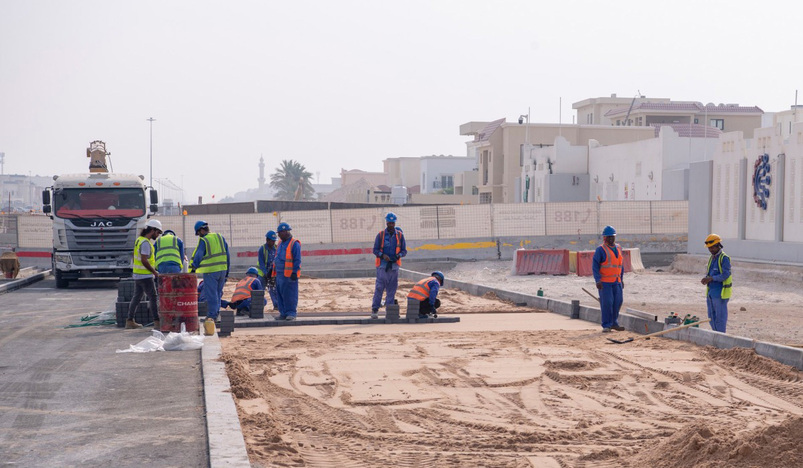
Doha City Project
The Public Works Authority ‘Ashghal’ has announced the completion of 50% of the total works in Waab Lebareg and Rawdat Al Thekhriya Streets in Ain Khalid, as part of Phase 1 of the Road Improvement in Doha City Project, aimed at regulating traffic on main streets, improving roads, and increasing their capacity to accommodate vehicles.
The project also aims to provide new parking spaces, enhance roads over a length of 3 km, and expand them to improve the traffic by constructing two interchanges with traffic lights. The project will also provide pedestrian and cycling paths, implement landscaping and greening works, and enhance infrastructure services.
Moreover, the project implements a campaign to reduce carbon emissions resulting from the overall works. The project team makes sure to identify high carbon emission construction activities to examine them and change the conventional ways of conducting them to reduce carbon emissions during the implementation stage.
On this occasion, Eng. Mooza Al-Sowaidi, Head of Doha City Section in the Road Projects Department at Ashghal, pointed out that Waab Lebareg and Rawdat Al Thekhriya Streets are among the most important streets in Ain Khalid area, and their development serves many residential units along with service and educational facilities, notably Umm Al Seneem Park, Umm Al Seneem Health Centre, Qatar Academy for Science and Technology, along with new shops and the shopping mall.
She said, “Ashghal spared no effort to support sustainability practices and green initiatives by engaging all stakeholders and professionals from consulting firms, contractors, and suppliers along with workers and others. We are making every effort to encourage all stakeholders to adopt positive environmental practices and to innovate and apply new solutions and methods at various stages of project implementation to maintain available resources, reduce long-term costs, and many other benefits.”
It further stated that the completion rate reached 50% with work done in one direction only in both Waab Lebareg and Rawdat Al Thekhriya Streets and opening them to traffic, providing 250 parking spaces for cars, and making progress in the infrastructure networks where 2.1 km -out of 3.5 km- of surface water drainage network was constructed, 0.4 km -out of 1 km- of potable water network lines were constructed, 4 km -out of 5 km- of power lines were installed, 1.5 km -out of 8.5 km- of street lighting cables were extended, and 24- out of 98- lighting poles were installed.
Work is currently underway to complete works of both streets’ second direction, including constructing 2 new traffic lights, implementing 6 km-long pedestrian and bicycle lanes, and applying landscaping and greening works.
Sustainability wise, particularly the effort to reduce carbon emissions, the project’s work team changed its approach during excavation operations of the project by utilising precise and heavy equipment capable of controlling and outlining the dimensions of the excavation in a way that does not exceed the requirements of design specifications and avoids unnecessary excavations. The project’s contractor, JAK Company, used Trencher and Chain cutter to avoid excess excavation and thus avoiding excess fuel consumption, directly resulting in low carbon emission.
As a result of these efforts, the carbon emissions from construction work at the project site in Ain Khalid have been reduced by approximately 323 tons, to date. These practices have also recorded other benefits that have a positive impact on the environment, safety measures, and conservation of resources. The use of such equipment has contributed to the reduction of noise and dust levels, as these machines emit lower levels than other conventional equipment and have also contributed to the reduction the project's total costs.
By applying these sustainability and environmental principles, Ashghal has realised significant achievements and encouraged project executors to adopt many positive practices aligned with Environmental Development, one of the four pillars upon which the Qatar National Vision 2030 is built. As for carbon emission reduction, Ashghal -since 2019- have prepared and implemented the "Environment and Sustainability Monthly Report", an innovative tool aimed at recording and controlling building materials and carbon emissions, thus contributing to emission reduction in 2023 on all of the department's projects.?
.jpg)
Qatar Secures Place Among the World's Top 10 Wealthiest Nations
.jpg)
Hamad International Airport Witnesses Record Increase in Passenger Traffic

Saudi Arabia: Any visa holder can now perform Umrah

What are Qatar's Labour Laws on Annual Leave?
Leave a comment